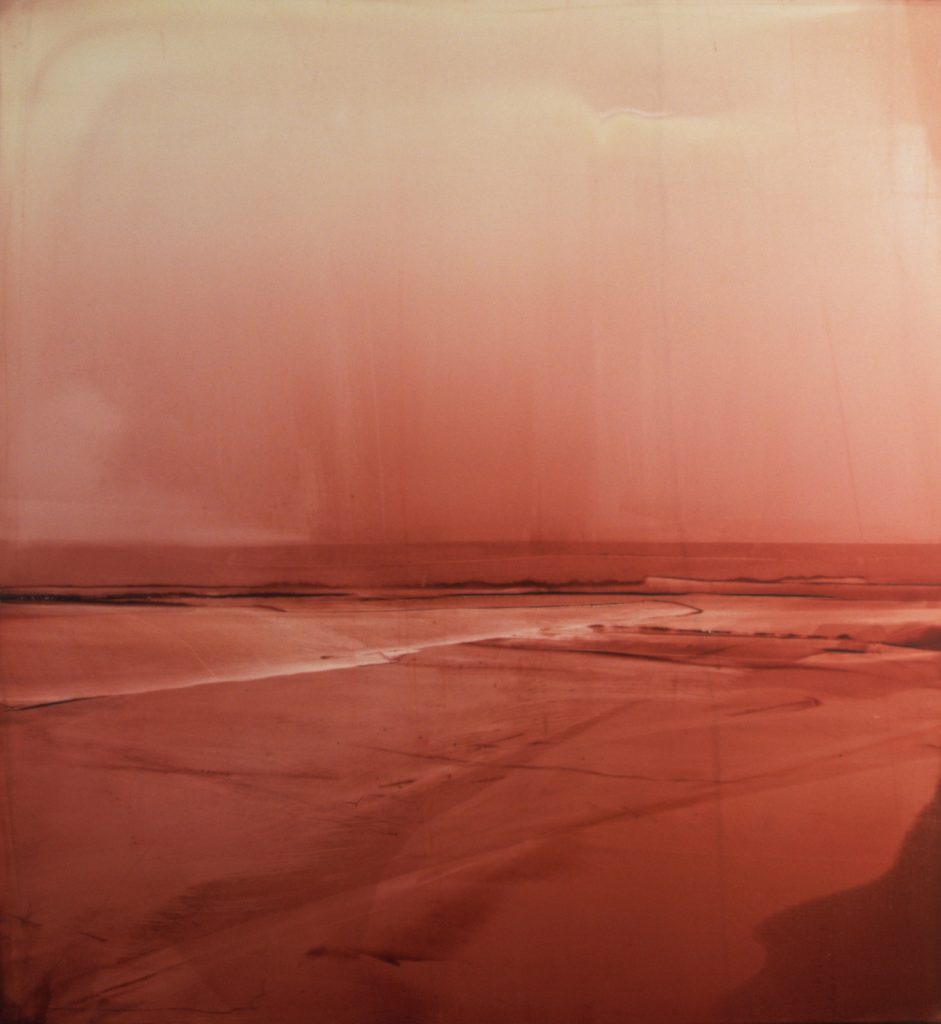The Gulf was dying already. For thousands of years, the Mississippi River, before being dammed and channelized, carried the tops of old ghost mountains down its winding corridor, emptying the continent’s heartland into the delta of south Louisiana. The river built the incredibly rich land there like a gardener dreaming a new garden, bringing in billions of metric tons of sediment, from upstream and spilling it enthusiastically into the marshes of the vast delta, which was sinking at a rate miraculously and perfectly in balance with that replenishment of sediment—as if the marsh itself were a set of lungs, inhaling but then exhaling: living. The shimmering grains of clay and organic matter nurtured the shrimp and oysters just offshore, and made it possible for me as a young person in this world—this made world, not past or future—to go out onto a pier on the Gulf at night and shine a flashlight into the bay and watch schools of glowing shrimp, like underwater fire, made phosphorescent by my light and by the stir of their own movements, their physical presence in the world, and the excitability of their internal bioluminescence. On a quiet night you could hear them clicking, squealing. Live in the here and now, we try to tell ourselves with every breath, but sometimes our love for the world—like our despair—wells up so strong within us that it is like its own kind of bioluminescence, a glowing, a burning that makes us feel more present in the world.
So not only is the Gulf despoiled with the poison of our need, being covered with oil, but it is sinking, too. Death is one thing, but extinction is quite another, and worst of all is extinction of habitat, so that not even the dream of resurrection can remain: for without the physical vessel to make visible and better understood the beautiful spirit, isn’t it all just smoke, ether, and dreams?
In order to love this world most fully, I need to know the specificities of things. I don’t always need to understand them—I like that there remains room in me for mystery and awe—but I do need to see, touch, taste, hear, smell the world’s wonders. Maybe it is a kind of spiritual set of training wheels, but if so, I hope I never lose them.
And yet we are losing them.
We wanted oil—oil is attached to every last one of us—and we got it. Such an old, weary lesson, Be careful what you ask for.
There is another, hidden story, even larger than the Gulf. We are a visual species; the plumes of crude jetting into the sea weigh heavy on our souls. But just across the U.S. border, up in the tar sands of Alberta, there is another equally horrific image. A gaping pit, an abyss on its way to becoming the size of Florida, exists where Imperial Oil—the largest company in the world—is using the wild Athabasca River to pressure-wash underground sand formations that they gouge up like honeycombs, using huge amounts of energy and clean fresh water to steam the oil from those sands. Native people in the area are dying from drastically abnormal incidences of rare cancers, and Imperial Oil is seeking to transport more giant mining equipment— on trucks over 200 feet long and three stories high—up the Snake River to Lewiston, Idaho, along the same route where the Nez Perce tribe rescued Lewis and Clark and directed them to the Pacific, shortly before the U.S. betrayed the Nez Perce and chased them toward Canada before killing them.
The Snake River is clotted with aging dams that are leading to the extinction of wild salmon. Imperial’s barging of behemoth earth-digging equipment up the Snake will require the expensive reclamation (by taxpayers) of the dams, rather than removing them so the salmon can run wild and free again instead of being caged at sea in bacterialaden coops, their pulpy flesh rotting from sores.
Once off-loaded from the barges, the giant trucks will creep down the highway at five miles per hour, prowling along Montana’s majestic Rocky Mountain Front, where grizzly bears and elk come down out of the mountains and out onto the plains that were once their home.
Sometimes you can see a disaster coming before it happens. The state of Montana envisions this route as becoming a major petrochemical corridor, despite the wishes of the native people on the reservations along this route. As a country we showed we could stop our support for apartheid in South Africa. But it was easy to give up diamonds; it’s not so easy to try to give up subsidized toxic oil. We can labor to save the panda and the rhino but find it harder to commit to salmon and grizzlies. We can protest human rights abuses in China, but the lines get blurrier when the abuses are on our own continent, linked to the flow of our oil.
This business of our physical lives is so complicated. Fight for salmon and grizzlies, but detach from the outcome? Witness the poisoning of the Gulf of Mexico, and of the wetlands, but detach from the extinction of an entire ecosystem?
I’m not there yet. I don’t think I can ever get there, and I’m not sure I even want to. What is it in me that holds so tightly to this burning—that refuses to let go of even despair? This puff of life, puff of breath, that we so briefly hold? This dab of soiled clay that is ourselves, made animate for a while.
Thank you for subscribing to Tricycle! As a nonprofit, we depend on readers like you to keep Buddhist teachings and practices widely available.
